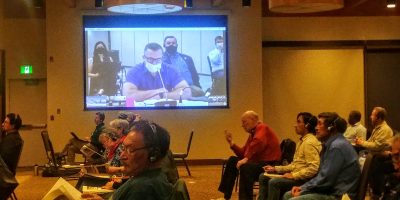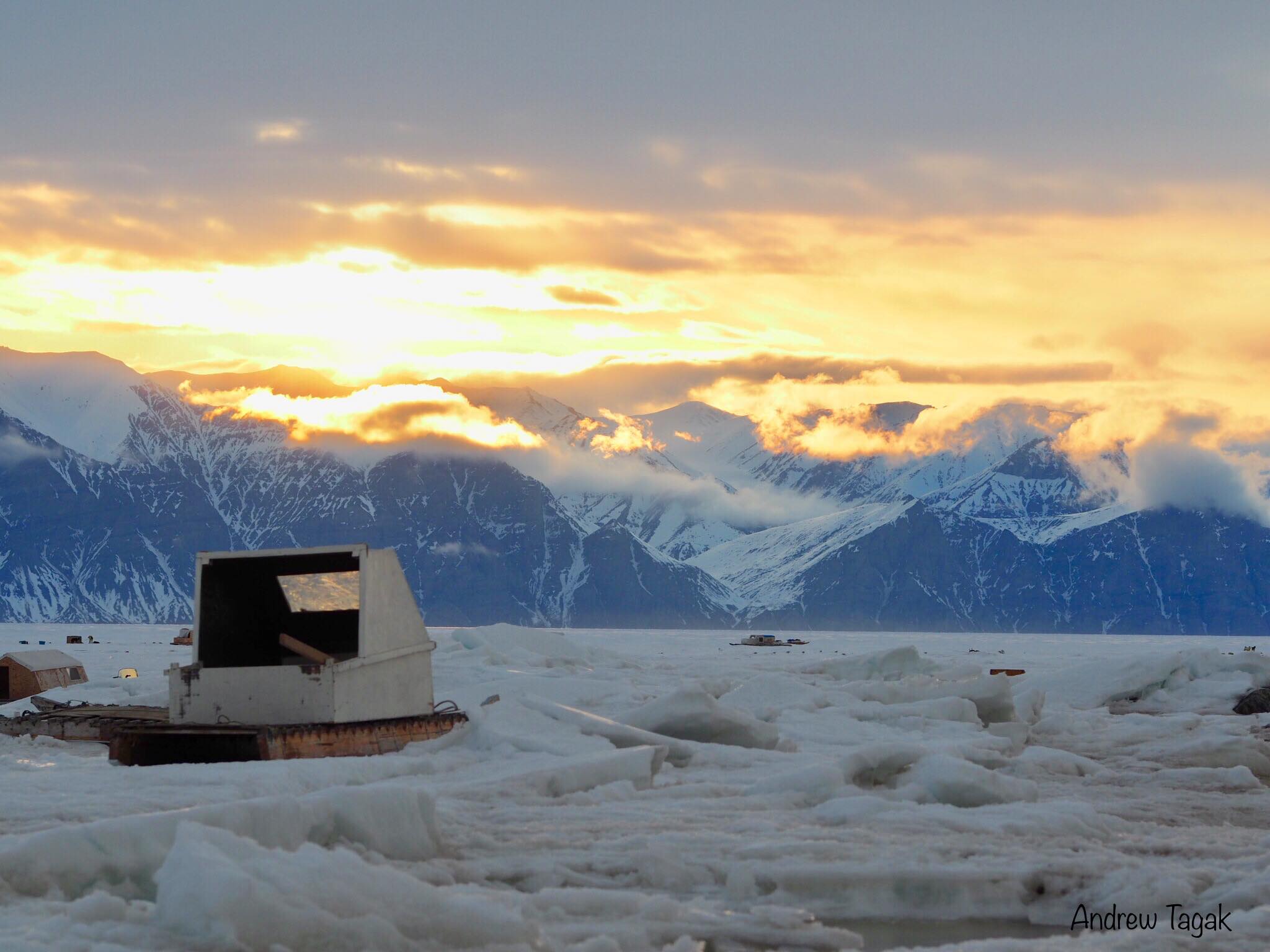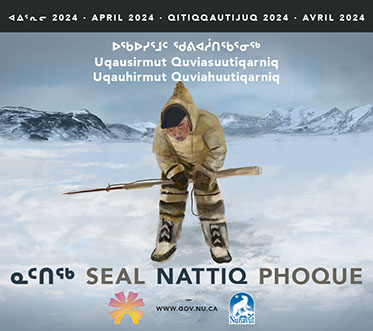Baffinland mine expansion threatens Inuit culture, North Baffin leaders say
Reps say that plans to boost iron ore output will affect marine mammals that Inuit depend upon
Qamutiks are seen on the sea ice at Pond Inlet, overlooking Bylot Island. Inuit leaders from North Baffin Island say that their culture could be destroyed if Baffinland expands its iron ore mine as planned. (Photo by Andrew Tagak)
North Baffin community leaders remain unhappy with Baffinland’s plans to expand its Mary River mine, following the most recent round of regulatory meetings.
How unhappy? Jerry Natanine, the mayor of Clyde River, says that if he had a military, he’d deploy it.
“This means war,” he said.
Similarly, when Eric Ootoovak, the chair of the Mittimatalik Hunters and Trappers Organization, was asked how satisfied he was with the meeting’s outcome, he said: “I am the least satisfied.”
Both worry about the environmental impacts of the mine expansion, and specifically how these changes will affect marine mammals that North Baffin Inuit depend upon.
Baffinland wants to increase the mine’s annual output of iron ore from six million metric tonnes to 12 million tonnes. Ootoovak and Natanine say that even with the current rate of extraction, animals like seals and narwhal that Inuit rely on are skinnier and changing their behaviour.
They warn that Inuit culture could be destroyed if the expansion of the mine continues on its current course.
The meetings, as part of the Nunavut Impact Review Board’s environmental assessment, were meant to allow the mining company to answer outstanding questions about how increased activity in the area will further impact species like caribou, narwhal, seal and Arctic char.
The meetings were also meant to allow community members from Pond Inlet, Sanirajak, Igloolik, Clyde River and Arctic Bay—the five communities on northern Baffin Island most affected by the mine—to participate in the process.
The COVID-19 pandemic has meant that meetings have largely been held remotely. Technical meetings were held in mid-September via teleconference.
The community roundtable and pre-hearing conference were held in Pond Inlet, with hubs in Iqaluit, Winnipeg and Ottawa. Live video was streamed into each location.
Natanine said that from a technical viewpoint, the meetings were “pretty amazing.”
But North Baffin leaders had wanted the meetings to be delayed until they could safely be held face-to-face, without COVID-19 restrictions.
Natanine said that the fact that the meetings were held remotely at this time, against the wishes of the community members, is the sort of thing “that’s been happening since colonization started.”
These meetings were called after Nunavut Tunngavik Inc. put forward a motion last year to delay the final public hearing of the NIRB’s environmental assessment to give the mining company a chance to answer outstanding questions from community members.
Isolation requirements waived for meeting technicians
The NIRB flew up technicians who set up a video conference system to livestream the meetings to hubs in Iqaluit, Ottawa and Winnipeg.
Isolation requirements for four technicians were waived in order for the NIRB to fulfil its legislated responsibilities, Karen Costello, the executive director of the NIRB, said in an email.
The technicians set up equipment in Iqaluit and Pond Inlet, and were present during the meetings, Costello said during a phone interview.

Brian Penney, president and CEO of Baffinland Iron Mines Corp., speaks from Ottawa to Iqaluit during the beginning of the community roundtables. (File photo)
Costello said, “[the meetings] were able to move forward based on the use of technology, and the ability of the current public health orders to have limited in-person gatherings.”
Pond Inlet seats full on first day, residents turned away
Representatives from the NIRB and the Qikiqtani Inuit Association, as well as community leaders and members, were present in Pond Inlet.
Leaders from the four other communities on North Baffin, like Natanine, flew to Iqaluit to participate in the meetings from there. People in the four communities aside from Pond Inlet could not participate in the meetings.
There were 17 seats for the public in Pond Inlet. They were filled on the first morning of the meetings, and the NIRB had to turn people away. But after the first morning, there were empty seats available to members of the public, Costello said.
Along with testifying in person, Costello said the NIRB has many ways it can “solicit feedback from parties.”
“That includes through the written submission. They could have called in and listened to the proceedings through the telephone; they can also continue to call our 800 number and speak to anyone at any time to provide feedback,” she said.
Ootoovak said that many people who wanted to participate in the meetings were turned away.
“We predicted this to be happening, and it happened,” he said, saying this is a reason why he opposed the meetings being held at this time.
“The very future of this community lies upon these hearings. This COVID is really putting limits to the real representations of this community,” Ootoovak said.
In an emailed statement to Nunatsiaq News, the chief executive officer of Nunavut Tunngavik Inc., Kilikvak Karen Kabloona, said that consultation processes during the pandemic “must provide for meaningful Inuit participation as required under the Nunavut Agreement.”
NTI was aware that seats would be limited during the community hearings, she said.
“NTI is taking note of the community concerns, [which are] important to the overall assessment of the consultation process.”
Next, Costello said the NIRB has 30 days to complete its pre-hearing conference report with “any type of decision” as to whether Baffinland’s proposal is ready for a public hearing to be resumed.






Hold your ground N. Baffin! Tactics the same as for the seismic testing. repeated meetings, petitions that dont carry over to new proponents, etc. The goal is to wear people down till they are tired of fighting and the companies get what they want.
NIRB famous for ignoring people and taking smoke breaks when people start saying things they dont want to hear. Why not just have a vote, count the numbers, issue solved, lol. We wish, right? Best of luck up there! 🙂
This means war!
‘
What a bunch of hyperbolic non-sense. Of course our local paper will print these kinds of threats as if they contain some kind of serious meaningful content. Rag
I am wondering how this NIRB process wil go on the saline effluent pipeline project AEM is trying to build which I estimate is opposed by 90% of the population. Should it be majority rules, or can one organization or group prevail over the other? At the end of the day, Inuit elect their officials, who make the decisions, despite them being vehmently opposed by the majority of citizens who become aware.
North Baffin communities should be moving forward and not backwards.
Hamlet officials cannot create jobs for their communities and it’s even worse if they want to keep the people whom they represent on welfare forever.
North Baffin is simply saying to maintain phase one and don’t proceed to phase two. Chill
There won’t be a mine in five years without phase two. Consider the impact to the local economies and the local workers if it shuts down. There are valid environmental and social concerns associated with the expansion, but there may be dire consequences to thousands of workers without it.
Your suggesting that there won’t be a mine without the expansion(why did it start planning 75 year life). In any case, the expansion is going to shorten the life of the mine(and the jobs) for certain!! 😉
Ottawa is not going to keep funneling money to this place when they realize that the people do not want to help themselves. Then what?
That’s the goal though, that Ottawa will support the creation and maintenance of some sort of utopian cultural museum, frozen in time… to progress, by this vision, is to move back into the past.
Seriously commenters?
Any of you know how many locals are actually employed and working at baffinland?
You know that all the benefits toted by QIA promised are only a go if phase 2 is approved?
Do you know what happens if airlines take too long to ship up store food?
Now compile that with no harvestable wildlife, what then?
Lets get your clevar answers
Theoretically the many millions of dollars that the QIA is receiving from Baffinland through the IIBA and the Certainty Agreement are supposed to be invested primarily in affected communities in the North Baffin. When combined with local employment and contracting opportunities the local economic benefits are considerable. The big question is do they outweigh the potential impacts to local wildlife (i.e. marine mammals)? That is what the NIRB is trying to determine through the public hearing process. However know that IF the NIRB denies Baffinland’s productions increase they will pull up stakes and leave and with them will go all the money and economic opportunity that the mine has to offer.
Also, if youve ever traveled on the land in winter, what do you prefer: canada goose coat, plastic boots and snow pants?
Or polar bear silipak, caribou parka, and seal clothing?
Lets say ottawa cuts back spending, or there is a major generator failure, or poor PPD planning? Animals are the lifeline up here. Only a fool would trade them for cash because southern goods only work when used with southern utilities.
Yes, but you need cash to go out hunting…right? You need to have a snowmobile, atv, boat, gas, food, good clothing and so on.
Unfortunately there are more serious issues affecting wildlife in the north than Baffinland ship traffic and ore dust. Illegal overfishing in international and Canadian waters is decimating fish stocks, causing low fat levels in narwhale and seals as well as leading to a mass extinction of species in the arctic ocean. Climate change and pollution is causing ice recession on massive levels which is causing the extinction of polar bears and affecting cariboo migration. Baffinland’s phase two us just a drop in a bucket of issues affecting the north. Stopping the expansion will not solve these issues. Only federal government action can make an impact. Protest, vote, call your MP, but trying to shut down an iron mine in its infancy will just lead to a damaged northern economy and mass unemployment.
After the construction phase (lasts only a few years), Phase 2 will have FEWER jobs than the current early revenue phase, bc they are replacing the trucks with rail lines and all those driving jobs will be lost. In the long term, moving ahead with Phase 2 would in fact cost the region jobs at the mine. You can look at Baffinland’s own documents, they show this. Also, Baffinland hasn’t actually met its Inuit employment target in even a single year in its entire history of operations. Mostly they hire southeners. We already know that Inuit employment is not a priority for Baffinland. The Hamlets aren’t going to gain any jobs from Phase 2.
What North Baffin needs to actually help their employment is for this project to have an operator that actually makes a point of making the investment in training and hiring Inuit, so the development actually leads to the kind of benefits North Baffin should be seeing. What North Baffin doesn’t need is for an expansion that chases away the animals while hiring mostly southerners and sending most of the money south. And thats what Phase 2 is.
I believe us southerners need to stay out of this conversation, listen to the people who live there, and support them. As long as we respect there house, we all will build wealth together. Last thing, they could of played the meeting live on a local radio station.
Any Nunavummiut, especially those of us living in north Baffin, has an interest in what is happening with this, regardless of where our ancestors came from.
Since the first explorers arrived in the north, we have seen more come and go than those who have stayed to live with us in the north.
This mine has an expiry date. Inuit living in the north will continue to live here. Baffinland will extract the ore and leave, never to benefit Inuit again. All they care about is the money that will benefit them for less than 50 years. Inuit will suffer the consequences of their actions over time. Inuit must prevail!!!
Those who side with Baffinland are those who are temporary; their opinions will go with them when they retire somewhere outside of Nunavut. There will come a time when Inuit will have the education to carry out the work that is being done by the present mining companies but by then the minerals will be gone and Inuit will be back to depend on the renewable resources that they have depended on for millennia.
Go Inuit Go. Make them make the right decisions for our future generation.
It is so hard to read all these comments by people who have no real life experiences and knowledge of the area. Not to mention that you don’t know that the resources are in such abundance that they will be sustainable for much longer than 50 year’s. More like centuries. It would take people who want to work for their future and not rely on a government to fund their lifestyle. The number of locals that really want to work is not great enough to work a mine let alone keep it running. Know that does not mean all the locals as I know of a few that go above and beyond and are amazing individuals. And I am proud to know them. Unfortunately this is not true for the majority. As for the impact well that is due entirely on the fact that earth like everything else goes through a cycle we call life. When the ice starts to melt the water gets warmer. When the water gets warmer the animals and mammals go further north. Thus changes the migration to the point of sometimes extinction. If you have any common sense you would understand this. When the ice is all gone this will then be followed by guess what extreme weather events. Followed by another ice age. It is the circle of life. It is got nothing to do with a railroad or B-trains the impact is so minimal it is absolutely insignificant.
The locals are being offered a more than sufficient amount of money to help sustain themselves for years behind can be anyone’s dreams. The fact that people can’t get this is so frustrating. Not saying Baffinland is the best company in the world but they are trying to at least be reasonable. If they go then the north would still loose there livelihood that they are fighting for. It is just the way it is. Polar bears, Narwal and seals will still be migrating further north to the point of non existent. However as you see other mammals will be moving north in there place.
Ok enough of my rant.
People get real and dear with life because life goes on.
Wow, you talk about change and don’t understand the change that the “locals” have seen . The exploitation by the settlers, namely the British HBC, the abuse by residential schools, not to mention our own national government. The changes in climate, animal behaviour, the change in lifestyle of a people all in less then a century. Tell me the Europeans are not exploiting Inuit once again by ramming their desires down our throats with their superior knowledge.
The “locals” don’t understand the environment, ecology in which they have survived in for centuries? The well educated fools who learn of our environment from between four walls against those who have lived what those learned scholars read. Those limited resources have been there since the beginning of time and if left alone will not go anywhere. Those who come to our lands for a time and give us pittance to destroy our environment. They, with fancy words and superior knowledge, saying Inuit will never have enough education nor will there ever be enough of them to carry out what the superior people’s can do now.
Inuit have come this far in the European’s education system in a less than sixty years whereas it has taken centuries for them to get to the level they are now.
How far have you really come, Silas? Not as far as you think…
Shrugs, I agree with you. We haven’t come that far yet, but there will come a time when Inuit will be equal and that is what I am trying to say. It has taken less than sixty years to come this far. Give us a another sixty and see how far we will have advanced then.
In grade school we asked our teacher what are the highest paying jobs. His response was Lawyers, Doctors, Engineers all the educated people have the highest paying jobs. We responded that we would become one of those. He said you won’t be able to but your children might. In our naivety we insisted that we would.
Today, none of us are in any of those positions. But I have two children, one who is a lawyer, studied at University of Victoria, and the other has Masters in Finance, studied at University of Toronto. What will their children achieve?
Congratulations on the achievements of your children. I’m sure this has given you some insight and appreciation into the kinds of hard work and sacrifice, and even courage it takes a person to make it through university and into that world.
.
It’s odd your grade school teacher would make those comments to you, even if they turned out to be true, who knows if they had to… i’m not sure.
If Jerry had enough guns and people he would deploy.
Where Jerry? This is not normal.
People are rightfully concerned. Already the animals are affected, hunters can see this. And all evidence points to Baffinland planning to scale up even more than what they’re telling communities. There is no honesty in this process. If there are impacts now, there will be even more as it expands. Leadership needs to just listen to the people on this one
The residents of Baffin want the work. They are good people. The leaders of these communities don’t want this project to move ahead because they are corrupt and have money. A local that I worked with at Baffinland told me that the herds of caribou no longer exist like years ago. Stop starving these people and move forward.
Resource extraction is necessary, and Canada/Nunavut is a resource nation. The Inuit benefit already from government programs, funded mostly from the south. Then when the south wants to do business, they say “no”. Unfortunately you don’t get to have your cake and eat it too. Why should the Inuit claim they are entitled to all the benefits of southerners but then tell them to stay away (and keep sending the cheques) ? This is an issue on the Inuit side.
Now, that being said…not all companies are created equal. Baffinland is bad news. Their are certain companies that have the leadership and culture necessary to do business with Nunavut. Baffinland is not one of them. They have only their interests at heart, and they are owned by a large international company based in Europe who don’t have Canada’s interests at heart, let alone Nunavut. Internally (I know many employees) it’s a toxic workplace with heavy criticisms towards the Inuit. They treat their own employees terribly…how do you think they will treat non-employees?
So yes, resource extraction is necessary, and the Inuit must understand they have to contribute, not just receive…but I agree that Baffinland will destroy Inuit culture in the area because they are a “bad news” company who has no business operating. Best case scenario is that Phase 2 is stopped, Baffinland goes away and a much more mature and respectful company does business with the Inuit the right way.